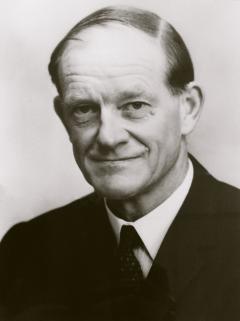Sir John Crofton
Sir John Crofton was an Edinburgh-based doctor who helped develop the first effective treatment for tuberculosis in the 1950s.

Sir John Crofton (1912-2009) was a prominent figure in respiratory medicine for more than 60 years and was at the forefront of the modern treatment of tuberculosis, smoking control and medical education.
Originally from Dublin, he studied medicine at Cambridge, graduating in 1933, serving later as a medical specialist in the Royal Army Medical Corps in France, Egypt, Eritrea, Greece, Malta and Germany.
Following post-war roles at the Royal Brompton hospital, London and the Postgraduate School of Medicine at Hammersmith hospital, in 1951 John was appointed Professor of Respiratory Diseases and Tuberculosis at the University of Edinburgh, later becoming dean of the faculty of medicine and then vice-principal.
When Sir John arrived in Edinburgh in 1951, tuberculosis was rife, with patients having to wait a full year for treatment.
Using his experience of antibiotics, he discovered that the infection could be successfully treated when three different antibiotics that had shown some success when used separately had a 100% success rate when used together.
As a result, by 1958, tuberculosis had been eradicated in Scotland. The “Edinburgh method” as it became known, was later adopted worldwide.
While the control of tuberculosis globally remained a focus, during his time in Edinburgh, John also took an interest in the harmful effects of smoking. He was one of those responsible for starting Ash-UK (Action on Smoking and Health) and also Ash Scotland (in 1973). Later, John became one of the World Health Organisation’s leading experts on tobacco control and travelled the world on behalf of WHO.
In 1977, the year of his retirement, he was knighted in recognition of his distinguished contribution to the management of tuberculosis and to medicine.

